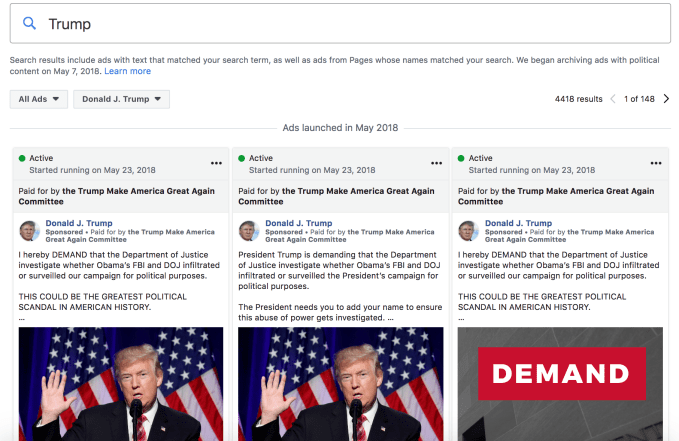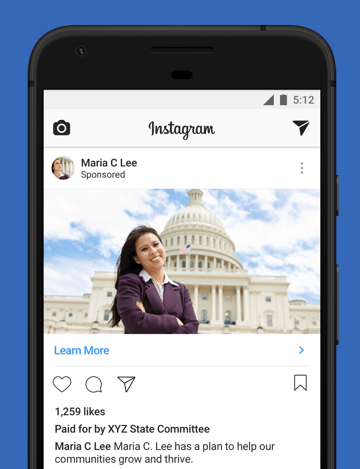Facebook today revealed that it’s chosen not to shut down all political ads because that could unfairly favor incumbents and candidates without resources to buy pricey TV ads. Instead, it’s now launching its previously announced “paid for by” labels on political and issue ads on Facebook and Instagram in the US, and its publicly searchable archive of all these politics-related ads that run in the US. That includes ads run by news publishers or others that promote articles with political content.
The labeling won’t just apply to candidate and election ads, but those dealing with political issues such as “abortion, guns, immigration or foreign policy”. Clicking through the labels that appear at the top of these News Feed ads will lead to the archive, which isn’t backdated and will only include ads from early May 2018 and after. The archive will hold them for seven years so they can be searched by keyword or Page who ran them. It will also display the ad’s budget, the and the number of people who saw it, plus aggregated, anonymized data on their age, gender, and location.

A look at ads run by Donald Trump’s official page inside Facebook’s new political ad archive
Any advertiser that wants to run political ads must now go through Facebook’s authorization process that requires them to reveal their identity and location, and advertisers will only have a week’s grace period starting today before those unauthorized will have their ads paused. Facebook plans to monitor political ads with a combination of artificial intelligence and 3000 to 4000 newly-hired ad reviewers as part of its doubling of its security team from 10,000 to 20,000 this year.

An example of a “Paid for by” label on an Instagram ad
They reviewers and AI will analyze these ads’ images, text, and the outside websites they point to look for political content. They’ll seek to avoid bias in classification by following guidelines on what constitutes one of 20 political issues from the decades-running Comparative Agendas Project. Users may also report unlabeled ads, which will then be reviewed, paused, and archived if they’re deemed political. Their buyer will then be required to go through the authorization process before they can buy more.
Facebook plans to provide a database available via a forthcoming API that will let watchdog groups, academics, and researchers review how ads are being used to influence elections. These tools will open to other countries in the following months, and Facebook plans to make all ads visible to everyone through a tool launching in June that’s now testing in Ireland and Canada.
Facebook’s chief product officer Chris Cox writes that “We hope that in aggregate these changes will be a big step to improve the quality of civic engagement in our products, and to keep the public discourse strong.”
Facebook held a conference call to discuss the launch with reporters this morning, but unfortunately timed it to end just 15 minutes before the news went out. You can listen to that call below, and we’ll have more analysis shortly.
Concerns With Facebook’s Push For Ad Transparency
While the labels and archive are good step towards transparency, there are still a number of problems with the program. Most specifically, while the political action committees and organizations that often fund political ads can have confusing or misleading names that obscure their true purpose. Simply listing those organizations in the Paid For By labels or archive won’t necessarily give users a lot of information about who the people behind the money are unless they’re willing to go digging across internet themselves.
Another issue is who will have access to the archive API, since the Cambridge Analytica scandal all started with an academic researcher accessing Facebook data.
“We won’t always get it right. We know we’ll miss some ads and in other cases we’ll identify some we shouldn’t” write Facebook’s Global Politics and Government Outreach Director Katie Harbath and Director of Public Policy Steve Satterfield.
These are the exact kind of tools and labels Facebook should have offered as soon as it began touting its ability to influence elections with its ads over a half decade ago. Better late than never, though.